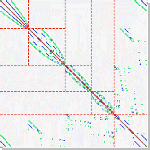
|
|
|||||||||||||||||||||||||||||||
|
|
SupportConference Chairs
Program
The goal of this series of conferences is to address the complex issues related to the solution of general sparse matrix problems in large-scale real applications and in industrial settings. The issues related to sparse matrix software that are of interest to application scientists and industrial users are often fairly different from those on which the academic community is focused. For example, for an application scientist or an industrial user, improving robustness may be far more important than finding a method that would gain speed. Memory usage is also an important consideration, but is seldom accounted for in academic research on sparse matrix solvers. As a last example, linear systems solved in applications are almost always part of some nonlinear iteration (e.g., Newton) or optimization loop. It is important to consider the coupling between the linear and nonlinear parts, instead of focusing on the linear systems alone. The speakers of this conference will discuss some of the latest developments in the field of preconditioning techniques for sparse matrix problems. The conference will allow participants to exchange findings in this area and to explore possible new directions in light of emerging paradigms, such as parallel processing and object-oriented programming. Date
|
|||||||||||||||||||||||||||||||